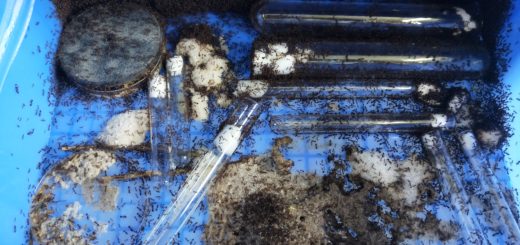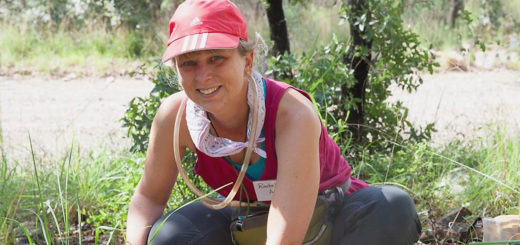Doing an ant PhD: Justin Walsh

© Justin Walsh
Justin Walsh is 27 years old, and he grew up in the suburbs of Philadelphia. He got his Bachelor’s and Master’s degrees in biology from Villanova University. He is currently a PhD candidate in the Linksvayer lab at the University of Pennsylvania.
An Interview compiled by Patrick Krapf 
MNB: What is the topic of your PhD thesis project?
JW: I am primarily interested in how the social environment affects behavior (and other phenotypes) and in identifying genes underlying behavior.
MNB: In which year of your PhD studies are you now?
JW: I’ll be starting my 5th year in the fall.
MNB: Why ants?
JW: Social interactions are ubiquitous in ant colonies – between workers, between workers and brood, between workers and queens. I am interested in understanding how and to what extent these social interactions influence the behavior of the individuals involved.
MNB: How do you feel about field work?
JW: I love field work, but unfortunately, I don’t get to do much field work for my PhD thesis besides occasionally collecting some colonies. However, I am involved with a science outreach project in the Galápagos working with sea lions, and that has been a blast!
MNB: … about identifying ants using a key?
JW: I don’t have as much experience doing this as I probably should, but I have always enjoyed working with a key to identify ant species.
MNB: … working in the wet lab?
JW: I enjoy lab work, but I can get sick of it, too. I try to rotate between lab experiments and analyzing data/writing to keep myself motivated.

© Aurora MacRae-Crerar
MNB: Have you been involved in any of the -omics approaches, and what was your experience?
JW: I have not done much yet, but over the next year I plan to. I’ll have a lot to learn!
MNB: Did you acquire your statistics knowledge in university courses, from your supervisor, or on your own?
JW: A little bit of all three. I took a great stats class at Villanova (thanks Dr. Russell!), and Tim (my supervisor) is always willing to provide advice or point me in the right direction.
MNB: What is the ideal frequency of meeting your supervisor for discussing your research from your point of view: daily, weekly, monthly?
JW: I probably message Tim at least a few times a week with smaller questions, but we meet at least once a month to discuss how my projects are going. I think this system works well for me.
MNB: If you have a great idea, how do you find out if it’s really great: sitting down and thinking, discussing with your supervisor, discussing with colleagues from the group, discussing with someone not into science?
JW: I find that bouncing ideas off of really anyone can be a great help, but I think talking with Tim is the most beneficial. He really helps me focus on the bigger picture.
MNB: How many papers do you read in an average week?
JW: It definitely depends on whether I am doing lab work or writing at the time, but I try to read at least one paper per day.
MNB: In an ideal world, is the working group you belong to small or large?
JW: Although I can see the benefits of working in a large group, I think I do better in smaller groups myself.
MNB: And ideally, is your uni close to your field-work site or in an urban area?
JW: I really enjoy city life, so I’ll say an urban area, but I would be happy either way.
MNB: Have you profited more from attending conferences with narrower or with broader scope?
JW: I’ve found that conferences with a narrower scope have been more beneficial for me. I tend to meet and chat with more people and seem to get better feedback on my work.

© Justin Walsh
MNB: What is most relevant to you at a conference: attending talks, giving a talk, meeting senior scientists, meeting other students?
JW: I think meeting other students. Listening to and exchanging ideas about each other’s work is valuable, and it’s also nice to bond over the struggles of completing a PhD and thinking about the next step.
MNB: Did you ever participate in a science slam and if so, what was your experience?
JW: I never have, but I would love to!
MNB: Do you explain the work of your PostDoc project to your kids?
JW: No kids yet, but my wife and I are expecting our first this November!
MNB: If you would get 100,000 Dollars to spend for your research project, what would you do with it?
JW: I would try to figure out a way to fully automate my behavioral assays and spend the rest on sequencing projects.
MNB: What helps you best in your spare time to relax from work?
JW: My wife and I have a Jack Russell. and I spend a lot of time walking/playing with him. I’m also a huge Philadelphia (Super Bowl champs!) and Villanova (National champs!) sports fan, so this has been an exciting year.
MNB: How do you celebrate successes like getting a paper accepted, a proposal granted, or the like?
JW: Our lab usually celebrates with a whiskey toast. My wife and I will go out to dinner, too.
MNB: What is your personal trick to get over periods of low(er) motivation?
JW: When I realize I’m lacking motivation, I try to find time to take a day off and do something fun. Seeing how hard my wife works in her career also motivates me to keep going.
MNB: What do you do to get over frustration about what you consider as unfair criticism by a reviewer?
JW: Venting to Tim or others in my lab really helps.
MNB: What is the one thing you would do differently when starting your PhD thesis project again?
JW: Start writing earlier!
MNB: Would you like to stay in science?
JW: I would love to stay in science. I have a real passion for both teaching and research.
MNB: If you will be supervising PhD students yourself, what will be the most important thing you will expect from your students?
JW: Dedication. A PhD is a long road – you need to be sure you want to make the trip.
MNB: … and what will be the most important thing you will want to take care of in supervising?
JW: Teaching my students to think for themselves but also know the value of seeking out help/advice. Also, making sure they have a good work-life balance.
MNB: Original article or review article?
JW: Original.
MNB: Reading or writing?
JW: Reading.
MNB: Writing or reviewing?
JW: Writing.
MNB: Reviewing or considering criticism by someone else?
JW: Criticism.
MNB: The first or last 5% of time you spend with writing a manuscript?
JW: Last. Starting a paper is always difficult for me.
MNB: Informative or sexy paper title?
JW: Informative.
MNB: Table or figure?
JW: Figure.
MNB: Web of Science or Google Scholar?
JW: Google Scholar.
MNB: Journals financed by the author (open access) or the reader (subscription)?
JW: Open access.
MNB: Windows, OS, or Linux?
JW: Windows or Linux.
MNB: Command-line or graphical-user interface?
JW: Command-line.
MNB: Mouse or touchpad?
JW: Mouse.
MNB: Facebook or Twitter?
JW: Twitter.
MNB: Bus or bike?
JW: Bike. I bike to and from lab every day.
MNB: Breakfast or dinner?
JW: Dinner. I am not a morning person.
MNB: Sun or rain?
JW: Sun.
MNB: Diploid or haploid?
JW: Diploid.
MNB: Sting or acid?
JW: Acid.
MNB: Social parasite or host?
JW: Host.
MNB: Your favourite ant paper?
JW: I really enjoyed the paper from LeBoeuf et al. in eLIFE titled “Oral transfer of chemical cues, growth proteins and hormones in social insects.”
MNB: Your favourite ant?
JW: Atta cephalotes.
MNB: … and if in another life you were an ant, what ant would that be?
JW: Again, Atta cephalotes.
MNB: Thanke you for this interview.
JW: Thank you for reaching out to me.





Good Are you interested in other groups too besides atta cepalotes.congratulations and best wishes
Thank you! Yes, I’m interested in all ants. Unfortunately, I don’t study actually Atta. I primarily work with Monomorium pharaonis
Hello, Justin. This is sandeep from India. Just read your interview and it’s so inspiring. Though I am not doing my Ph.D. in ants, but interested in them. Recently I found a Monomorium colony, but can not identify the species. If you have keys, please send me.
Thank you.
Email-mahapatrasandip.1@gmail.com